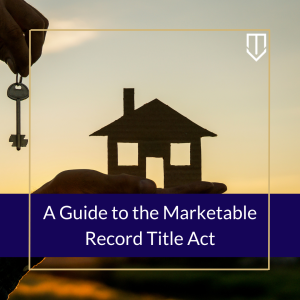 The Marketable Record Title act provides a statutory time limit to eliminate certain liens. Specifically, the purpose is to enhance the marketability of property by fixing an expiration date for certain interests, which are generally ancient mortgages, deeds of trust, unexercised options, powers of termination, unperformed contracts for the sale of real property, dormant mineral intersts, and abandoned easements, while also providing a procedure for allowing the interests to be preserved. In other words, the Act helps to simplify and facilitate real property transactions. In this blog, we’ll delve into what the Marketable Record Title Act entails, its significance, and how it impacts property owners.
The Marketable Record Title act provides a statutory time limit to eliminate certain liens. Specifically, the purpose is to enhance the marketability of property by fixing an expiration date for certain interests, which are generally ancient mortgages, deeds of trust, unexercised options, powers of termination, unperformed contracts for the sale of real property, dormant mineral intersts, and abandoned easements, while also providing a procedure for allowing the interests to be preserved. In other words, the Act helps to simplify and facilitate real property transactions. In this blog, we’ll delve into what the Marketable Record Title Act entails, its significance, and how it impacts property owners.
What is the Marketable Record Title Act (MRTA)?
The Marketable Record Title Act is a piece of legislation adopted by many states in the United States with the aim of clarifying and simplifying real property titles. Its primary objective is to extinguish certain old and dormant interests in real estate, thereby providing buyers with a more secure and marketable title. (see Robin v. Crowell (2020) 55 Cal.App.5th 727.)
 California Partition Law Blog
California Partition Law Blog


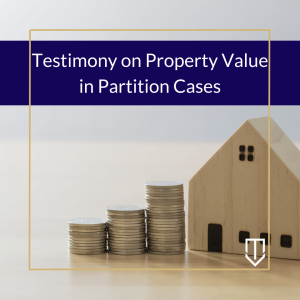 The estimated value of a piece of property can be important for resolving several types of legal disputes. It is crucial when a property owner needs to establish damages when the government interferes with the owner’s property and diminishes its value. Spouses may wish to testify regarding the value of their marital property when it is divided during divorce proceedings. A property owner may also want to testify as to their property’s value to contest a bank’s foreclosure on the property.
The estimated value of a piece of property can be important for resolving several types of legal disputes. It is crucial when a property owner needs to establish damages when the government interferes with the owner’s property and diminishes its value. Spouses may wish to testify regarding the value of their marital property when it is divided during divorce proceedings. A property owner may also want to testify as to their property’s value to contest a bank’s foreclosure on the property. Generally, every owner of property is liable for injuries on their property when it is not in a reasonably safe condition. (Cody F. v. Falletti (2001) 92 Cal.App.4th 1232.) If a party was a
Generally, every owner of property is liable for injuries on their property when it is not in a reasonably safe condition. (Cody F. v. Falletti (2001) 92 Cal.App.4th 1232.) If a party was a 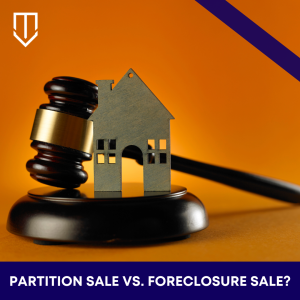 Partitions sales and foreclosure sales are two different ways that a property can be sold. The main difference between the two is the purpose behind the two sales. For partition sales, the purpose is to divide the property and for the owners to get the proceeds in proportion to their ownership. The purpose of foreclosure sales is to pay off a borrower’s loan.
Partitions sales and foreclosure sales are two different ways that a property can be sold. The main difference between the two is the purpose behind the two sales. For partition sales, the purpose is to divide the property and for the owners to get the proceeds in proportion to their ownership. The purpose of foreclosure sales is to pay off a borrower’s loan. 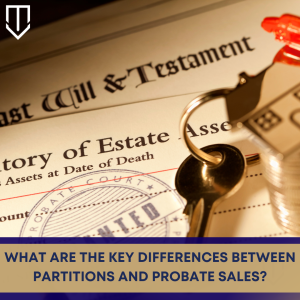 Partitions sales and probate sales are two different ways that a property can be sold. A main difference between the two is that a partition sale is ordered and overseen by the court, while a probate sale is generally overseen by a personal representative, and the court can have minimal involvement. There are also specific steps that the personal representative must take in the probate sale process under California law.
Partitions sales and probate sales are two different ways that a property can be sold. A main difference between the two is that a partition sale is ordered and overseen by the court, while a probate sale is generally overseen by a personal representative, and the court can have minimal involvement. There are also specific steps that the personal representative must take in the probate sale process under California law.  Yes. California law allows a co-owner to take out a mortgage without the other co-owners consent or knowledge.
Yes. California law allows a co-owner to take out a mortgage without the other co-owners consent or knowledge. 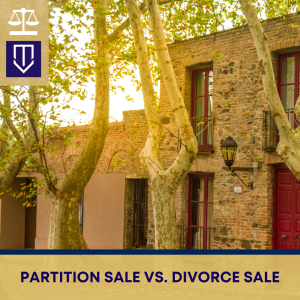 Partitions sales and divorce sales are two different ways that a property can be sold. One difference between the two is that in a partition sale, the court usually decides the proportion of ownership and how the proceeds are distributed among the owners, while in a divorce sale, the court generally must divide the property equally. Another difference is that the divorce sale process is similar to a normal real estate sale. Both sales can be determined informally among the parties or ordered by a court.
Partitions sales and divorce sales are two different ways that a property can be sold. One difference between the two is that in a partition sale, the court usually decides the proportion of ownership and how the proceeds are distributed among the owners, while in a divorce sale, the court generally must divide the property equally. Another difference is that the divorce sale process is similar to a normal real estate sale. Both sales can be determined informally among the parties or ordered by a court. 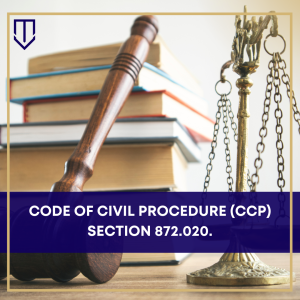 California Code of Civil Procedure section 872.020 is under Title 10.5 Partition of Real and Personal Property. This statute details the scope, or in other words, the
California Code of Civil Procedure section 872.020 is under Title 10.5 Partition of Real and Personal Property. This statute details the scope, or in other words, the  Partitions sales and trustee sales are two different ways that a property can be sold. A main difference between the two is that a partition sale is ordered and overseen by the court, while a trustee sale is overseen by a third party in relation to foreclosure proceedings. While the third party is not beholden to a court ruling in a trustee sale, they must still follow the procedures outlined in California law.
Partitions sales and trustee sales are two different ways that a property can be sold. A main difference between the two is that a partition sale is ordered and overseen by the court, while a trustee sale is overseen by a third party in relation to foreclosure proceedings. While the third party is not beholden to a court ruling in a trustee sale, they must still follow the procedures outlined in California law.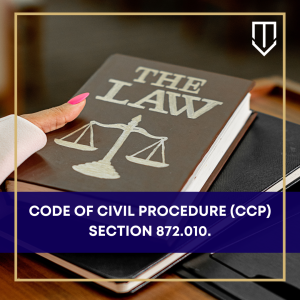 The
The